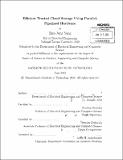| dc.contributor.advisor | Srinivas Devadas and Nickolai Zeldovich. | en_US |
| dc.contributor.author | Yang, Hsin-Jung | en_US |
| dc.contributor.other | Massachusetts Institute of Technology. Dept. of Electrical Engineering and Computer Science. | en_US |
| dc.date.accessioned | 2012-12-13T18:52:23Z | |
| dc.date.available | 2012-12-13T18:52:23Z | |
| dc.date.copyright | 2012 | en_US |
| dc.date.issued | 2012 | en_US |
| dc.identifier.uri | http://hdl.handle.net/1721.1/75690 | |
| dc.description | Thesis (S.M.)--Massachusetts Institute of Technology, Dept. of Electrical Engineering and Computer Science, 2012. | en_US |
| dc.description | Cataloged from PDF version of thesis. | en_US |
| dc.description | Includes bibliographical references (p. 85-90). | en_US |
| dc.description.abstract | Cloud storage provides a low-cost storage service with high efficiency and global accessibility via the Internet, but it also introduces security risks. One major security concern is the integrity and freshness of data stored on the cloud, that is, whether a storage provider can guarantee that the data received by its clients is always correct and up-to-date. Recent studies have focused on data integrity and freshness guarantees. However, systems that solely rely on cryptography are not able to immediately detect data freshness violations, while systems using resource-constrained trusted hardware are impractical due to long latency and low throughput. In this thesis, we describe a prototype of a trusted cloud storage system that efficiently ensures data integrity and freshness by attaching a piece of high-performance trusted hardware to an untrusted server. We propose a write access control scheme to prevent unauthorized writes and ensure all writes are fresh. We also introduce a crash-recovery mechanism to protect our prototype system from crashes and power loss events. In addition, we minimize the system overhead by (1) parallelizing and pipelining the operations that are carried out on the server and the trusted hardware and (2) judiciously partitioning the operations across the trusted and untrusted components. The throughput and latency of our prototype system are analyzed to provide customized solutions to performance-focused and budget-focused cloud storage providers. We believe this work takes a major step in making trusted cloud storage practical from an efficiency and cost standpoint. | en_US |
| dc.description.statementofresponsibility | by Hsin-Jung Yang. | en_US |
| dc.format.extent | 90 p. | en_US |
| dc.language.iso | eng | en_US |
| dc.publisher | Massachusetts Institute of Technology | en_US |
| dc.rights | M.I.T. theses are protected by
copyright. They may be viewed from this source for any purpose, but
reproduction or distribution in any format is prohibited without written
permission. See provided URL for inquiries about permission. | en_US |
| dc.rights.uri | http://dspace.mit.edu/handle/1721.1/7582 | en_US |
| dc.subject | Electrical Engineering and Computer Science. | en_US |
| dc.title | Efficient trusted cloud storage using parallel, pipelined hardware | en_US |
| dc.type | Thesis | en_US |
| dc.description.degree | S.M. | en_US |
| dc.contributor.department | Massachusetts Institute of Technology. Department of Electrical Engineering and Computer Science | |
| dc.identifier.oclc | 820028137 | en_US |
